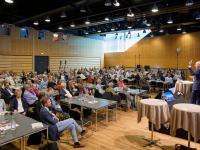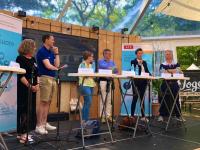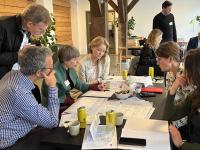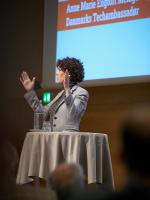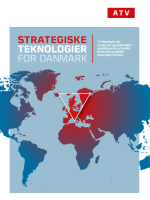Listening to nature’s music
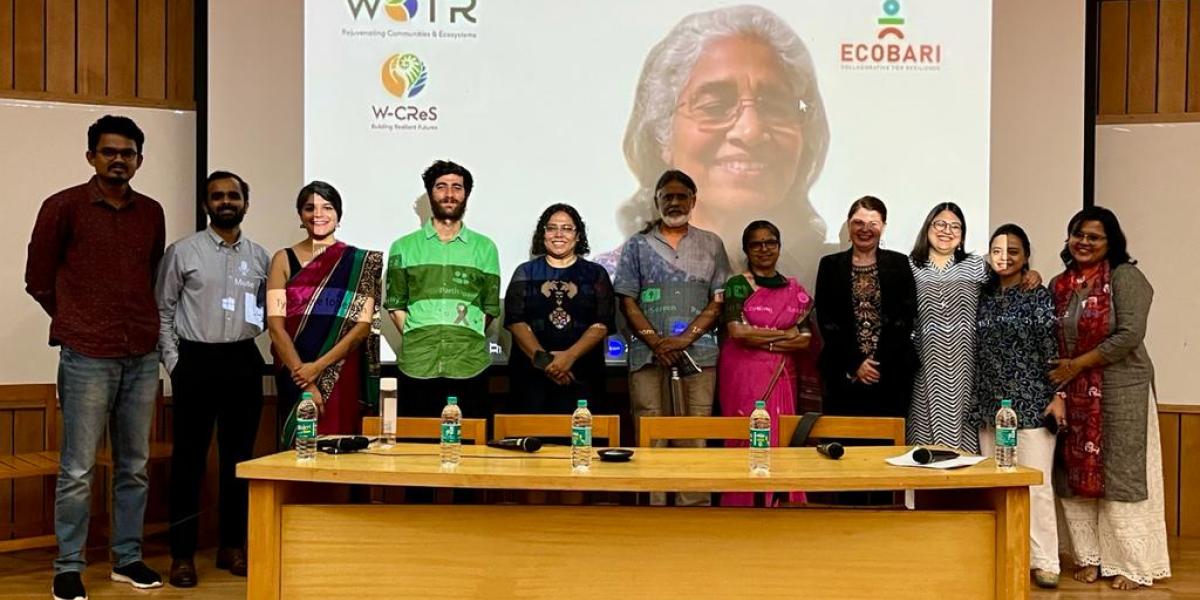
Global Director for echo network, Shannon Olsson, taler ved Indiens åbning af G20-værtsskabet den 13. december. Læs hendes tale, som handler om, hvordan echo-netværket gennem vidensdeling og fællesskaber på tværs af forskere, beslutningstagere, lokale samfundsorganisationer, private virksomheder og offentligheden øger opmærksomheden på klimadagsordenen.
Over 15 years ago, the Washington Post attempted a now famous social experiment. Dressed in jeans, a t-shirt, and a baseball cap, one of the most celebrated violinists of our time, Joshua Bell, performed solo in the Washington DC Metro during the morning rush hour. During his 43-minute performance, over 1000 travelers would hear the works of art that emerged from his 3 million dollars, 300-year old Stradivarius instrument. The experiment was simple. How many would stop and listen to a virtuoso in the subway? If you had entered the metro station that day on your usual morning routine and had suddenly heard the most transcendent instrumental music in your life, would you have taken a moment to listen?
After 43 minutes, only 7 people - less than 0.1%, stopped for more than a minute, and only 2% put money in the violin case at his feet. So what happened to the other 98% of people who didn’t give more than a glance at one of the most famous violinists in the world? Many travelers later interviewed about this experience remarked that they had heard the virtuoso but were too busy at the start of the workday to stop and listen. Some didn’t hear the music at all because they were wearing headphones. A shoe shiner was annoyed that the music was interfering with her work. And as always, a few heard and simply didn’t care.
This mix of viewpoints mirrors our current struggle with the SDGs. As a planet, we are far from the goals set in 2015. Like 98% of the passengers in that metro, we do not stop, listen to, or engage with these goals. Anthony Leiserowitz of the Yale Program on Climate Change Communication has surveyed people worldwide on their perceptions of climate change, including the US and India. In both countries, he suggests there are Six Americas and Six Indias, who range from the convinced and informed to the dismissive and disengaged.
Source: Climate Communication
These personas are reflected in equally the metro travelers and our world’s response to the SDGs. Most, like the bureaucrats in the metro, are too busy with other issues. Some, like the shoe shiner, are crushed under the weight of disempowerment and cannot listen. Others, like the man in headphones, are so far removed from the problem they can’t even identify it. However, most of the travelers in that metro had the capacity to appreciate the music, just like we appreciate the importance of the SDGs.
We are not ignorant. We are not unaware. We are simply… unavailable.
Prime Minister Modi unveiled India’s Mission LiFE at COP26 in Glasgow in 2021 as a collective approach to sustainability with three stages:
- DEMAND: Nudging behavior
- SUPPLY: Enabling markets
- POLICY: Redefining long-term aspirations
But with 98% of us unavailable, how do we get people to stop, listen to, and engage with these stages?
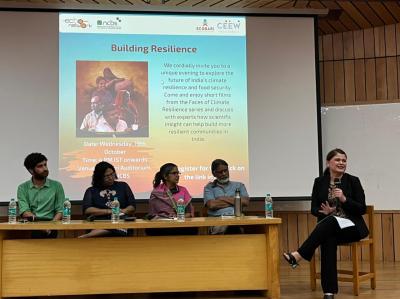
First, we need everyone to pay attention. Just making noise about the SDGs is not enough. Joshua Bell was also making a lot of noise in that metro station, and still, 1000 people passed him by. If a friend, relative, or neighbor had asked the travelers to stop, they would be much more likely to do so. People need people they can trust. And people trust who they know.
We need sustainability champions in every community and, eventually, every home equipped with the latest knowledge. Support for social innovation organizations like the echo network and public-private partnerships with local governments and organizations are excellent mechanisms for training and empowering these champions in their communities.
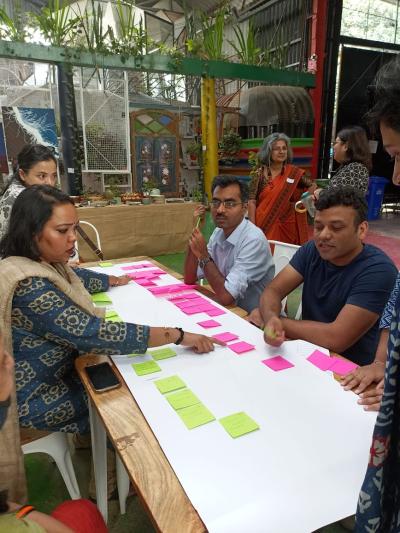
Second, we need our audience to listen to the SDGs. This means the audience must value spending their time and energy on sustainable goals. When the Washington Post interviewed the travelers who took the time to stop and listen, most either played the violin or, in one case, recognized Joshua Bell as a famous violinist. They connected personally with the music.
Mission LiFE intends to enable markets to tailor sustainable innovations for the values of the public sector. Yet, while innovations often start with scientists like me in laboratories, few begin by connecting to people and their values. We need to support human-centered innovation that connects the public to innovation right at the beginning of the scientific process.
In India, the echo network is hosted by Social Alpha and supported across sectors by Hindustan Unilever Limited, Bill and Melinda Gates Foundation, and ATREE. Through this collaboration, we connect communities, organizations, businesses, and academia to establish communities of practice that learn from each other, co-create standard solutions and iteratively enhance solutions through regular interaction and evaluation.
We are testing these solutions with our implementation partners ECOBARI, Biodiversity Collaborative, The Bengaluru Science and Technology Cluster, Roundglass and Innovation Centre Denmark. In Denmark, we are fortunate to be hosted by the Danish Academy of Technical Sciences through support from the Novo Nordisk Foundation to bring international ideas together. These bicontinental hubs ensure that our solutions address global sustainability needs.
Third, we need people to continue to engage with our sustainable goals. All of us, at every level of society, must feel personally responsible for achieving the SDGs. LiFE has proposed the importance of decision-makers in institutionalizing this process for our collective future. For more than 50 years, we have presented our future as a planet in crisis. Indeed, the impacts of our unsustainable lifestyles are both tragic and terrifying, and they impact most those of us who are least empowered to address these issues.
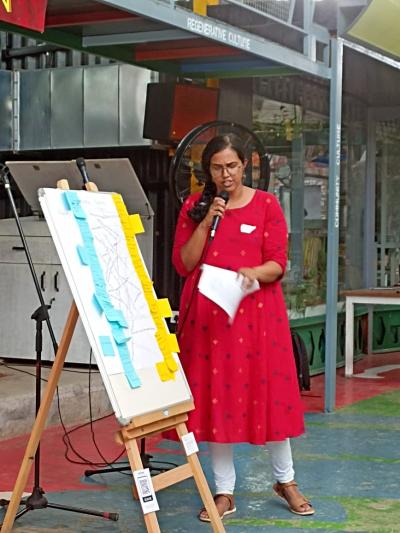
Hope drives responsibility
Fear does not drive responsibility. Only hope can. And I am hopeful. For the first time in human civilization, we can consider completely new ways to live. New ways to move. New ways to grow and eat food. New ways to wear clothing. New ways to build cities and even new ways to live together with each other and with our ecosystems. Imagine - we don’t even need to go to Mars to think about how to live on a planet. It’s precisely what we need to do here on Earth. And those countries most impacted by our changing planet are also the best positioned to drive discoveries that sustain it.
That’s why I moved to India in 2014, to learn from this people and this land how to better contribute to preserving our collective future. Working together across borders can bring this new era of humanity to the globe. Countries like Denmark have engaged in the Green Strategic Partnership with India to combine experiences from both countries and create a new future for everyone.
The path to a sustainable future starts not with the head but with the heart. We are the echo network because we believe, like an echo, in the power of first listening, and then giving back by building trust through local champions, establishing value and connection through human-centered innovation and responsibility through communities of practice who live the new reality we have built for ourselves. Let’s start now. Stop. Listen. Engage. Before this train leaves the station. Can you hear it? Our world is calling.
